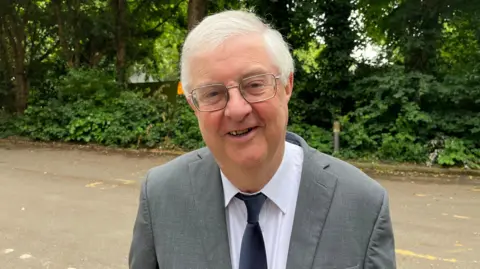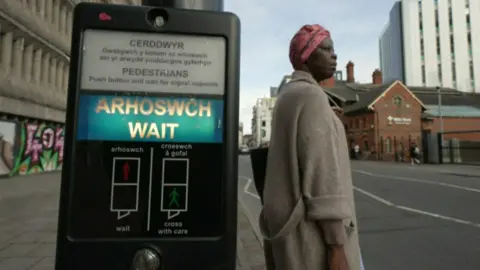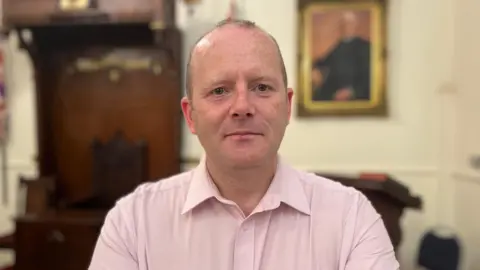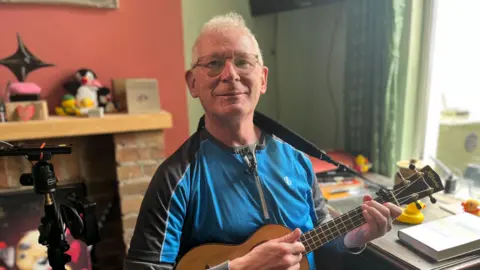Unionist Irish language fears can be addressed - former Welsh first minister
 BBC
BBCUnionists in Northern Ireland have "legitimate concerns" over the Irish language but they "can be addressed", the former first minister of Wales has said.
Mark Drakeford, the Welsh Government's language secretary, said political agreement on Irish would be "healing rather than divisive".
It comes as disputes continue at Stormont over the Irish language, including rows about bilingual signage and its cost.
Drakeford, a Welsh speaker who encourages bilingualism in Wales, said unionists have nothing to fear if Irish "is done in a way that is sensitive to their concerns".
Speaking to BBC News NI's Sunday Politics programme, he said language should not be used "as a political football".
"I think, done the right way, concerns can be addressed," he said.
"That's not to say that concerns aren't legitimate."
The development of policies in Northern Ireland to promote the Irish language has long been a point of dispute between unionists and Irish nationalists.
In Wales, the Welsh language is more widely accepted and is commonly displayed alongside English in public spaces, such as on road markings and street signs.

Drakeford, former leader of the Welsh Labour Party, said he was "perfectly comfortable" with having a Welsh and British identity.
Asked about unionist concerns over Irish, he said that being "undoubtedly Welsh doesn't diminish your sense of being part of the United Kingdom".
But Drakeford said unionists have "legitimate concerns" and are "entirely entitled to make sure that's part of the public debate".
'Languages are special'
Northern Ireland's devolved government is currently recruiting an Irish language commissioner and a commissioner for the Ulster-Scots and Ulster British tradition.
The roles were key parts of language legislation introduced in 2022 by Westminster, which stepped in following a political stalemate at Stormont over the laws.
Interviews for the posts are due to take place this month, Deputy First Minister Emma Little-Pengelly told the Northern Ireland Assembly on Monday.
She added that she and First Minister Michelle O'Neill were committed to making the appointments "as soon as possible".
Wales has had a Welsh language commissioner since 2012. Their powers include investigating complaints against public bodies.

Efa Gruffudd Jones, who has held the role for more than two years, said that "languages don't need to divide us".
"Languages are special things, and people can express themselves differently in different languages," she said.
"So I would hope that people can respect other people's languages and ensure that they can enjoy using it."
Grand Central Station signs
Irish signage has been a key point of contention at Stormont, with parties clashing over proposals to spend £150,000 on bilingual displays at Belfast's Grand Central Station.
The plan by the infrastructure minister is being challenged in the courts.
At local council level, there have also been disputes over the introduction of dual-language street signs in some neighbourhoods.
They have been vandalised more than 300 times in five years.
Northern Ireland's 11 local authorities have varying policies on installing dual-language street signs.
In Belfast, proposals for a street are considered by a council committee if 15% or more of all occupants surveyed express support.
More than 200 have been approved since the policy was introduced a few years ago.
Of those approved, the average survey received about 34% of replies in favour, 4% against, 1% no preference, and 61% no response.
The figures were obtained by BBC News NI through a Freedom of Information (FoI) request.

Belfast councillor Ron McDowell, deputy leader of Traditional Unionist Voice (TUV), said many unionists felt Irish was being "thrust upon them".
"People are vehemently opposed to the Irish dual-language street signs because they see it as a weapon - it's a cultural warfare," he said.
"It's being used by nationalist politics for identity politics - to mark territory."
Ian Malcolm, from Lurgan in County Armagh, is a Protestant, a unionist and an Irish language teacher.
He said that Irish "does not in any way diminish a person's Britishness", but should also not be "forced down anyone's throat".

Describing it as a "beautiful, wonderful language", he added: "It tells us so much about who we are, about our history.
"I think that everyone can embrace that, without surrendering one inch of your unionism."
